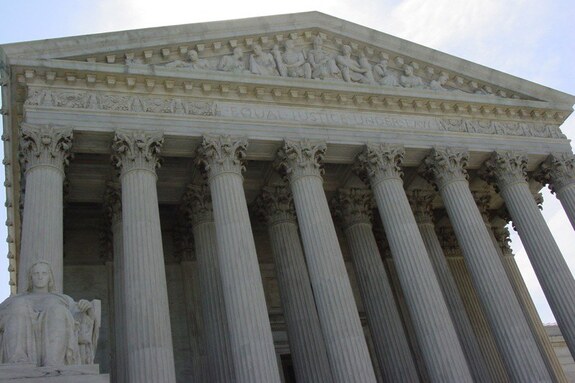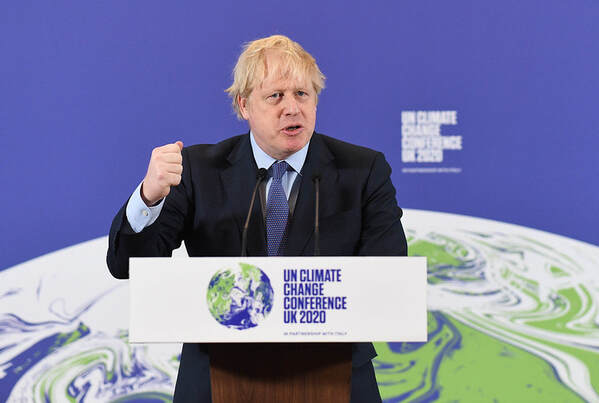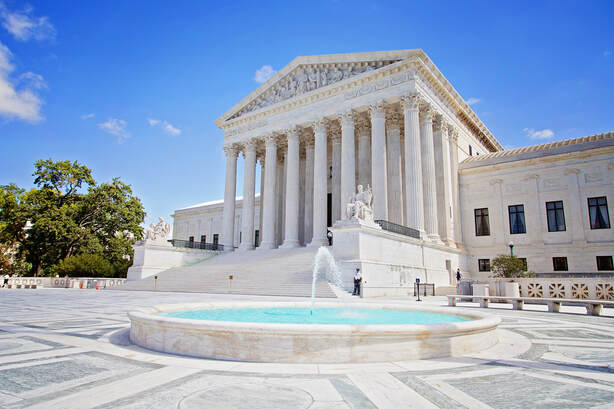Baltimore and its Backers Brief U.S. Supreme Court, Push Back Against Oil Companies' Arguments12/31/2020 The city of Baltimore and its supporters in litigation against the fossil fuel industry over climate damages are pushing back against industry arguments in oil companies’ appeal before the Supreme Court. The Supreme Court will hear the case on January 19, 2021.
In recent briefs submitted in December to the Court, Baltimore and its backers, or amici, argue that the oil companies like Chevron, BP, and ExxonMobil are exploiting a narrow statutory provision that allows for federal appeals courts to review federal court decisions – called remand orders – sending a case back to its state court origins. Baltimore and a coalition of state and local government groups specifically call out this exploitation as “gamesmanship” in their briefs. The issue before the Supreme Court is technically a very wonky one regarding a question of federal civil procedure, namely the scope of appeals courts’ review of remand orders as outlined in a statutory provision (USC § 1447d). However, the oil companies being sued by Baltimore – and the companies’ backers or amici – are urging the Supreme Court to issue a sweeping decision beyond this specific question that would essentially determine that all climate-related lawsuits necessarily belong in federal courts where they must then be dismissed. Baltimore’s climate lawsuit, and others like it brought by states and municipalities against fossil fuel companies, have been tied up in procedural wrangling over this federal vs. state court issue. This wrangling has caused considerable delay in the litigation, which seeks to hold fossil fuel companies liable for alleged deception and disinformation campaigns on the dangers of their products to the climate system. In a climate liability case similar to Baltimore’s brought by several Colorado municipalities, for example, the battle over federal vs. state court jurisdiction has dragged out for a year and half already. The Colorado communities - the city and county of Boulder and San Miguel County – are suing Exxon and Suncor entities to hold them accountable for climate disinformation and damage. These communities submitted a brief backing Baltimore. Their brief notes that the oil company defendants in their lawsuit have recently filed a petition to the Supreme Court (filed December 8, 2020) seeking the same appeal and relief that the companies seek in the Baltimore case. The Colorado brief also says that the companies’ appeal is disingenuous because their end game is to avoid accountability in court altogether; as the brief puts it, the companies are “setting up a game of three-card Monte, where they simply can never be sued.” Another amicus or supporting brief backing Baltimore came from 20 attorneys general (all Democrats) from 19 states plus the District of Columbia. A handful of these AGs have brought lawsuits of their own against the oil companies over the alleged deception and fraudulent conduct, all under state law claims such as consumer protection statutes that have no relevance to federal law or federal interests. “Like Baltimore in this case, States have sought to enforce their own laws by bringing lawsuits under state law in state courts against fossil-fuel companies for their decades-long campaigns to conceal their knowledge of climate change and the central role their products play in causing climate change,” the AGs note in their brief. The states’ brief also explains how this Supreme Court appeal and procedural wrangling in climate cases needlessly delays the litigation. “These delays defer desperately needed relief,” the brief argues. “Baltimore, Rhode Island, and similar plaintiffs brought these actions at the time that they did because state and local governments are incurring costs from climate change effects now…But defendants have been able to delay any reckoning by endlessly litigating threshold removal questions. It should not take three years to determine which court should hear a case.” The attorneys general supporting Baltimore in this appeal represent Rhode Island, New York, California, Connecticut, Delaware, DC, Hawaii, Illinois, Maine, Massachusetts, Michigan, Minnesota, Nevada, New Jersey, New Mexico, North Carolina, Oregon, Vermont, Virginia, and Washington. Another group of states with Republican attorneys general are backing the oil companies. The U.S. federal government under the outgoing Trump administration is also supporting the companies, as are a handful of fossil fuel industry trade associations and allies like the American Petroleum Institute, the National Association of Manufacturers, and the U.S. Chamber of Commerce. But one brief backing Baltimore, submitted by six U.S. Senators (all Democrats), calls out these friends of Big Oil. As the senators explain, these groups are tied to fossil fuel funding and interests and have helped block policy action on climate; yet these groups and the oil companies aim to deprive communities of pursing climate-related actions in courts in favor of political forums where they have undue influence. “They ultimately wish to steer all such [climate] matters into the executive and legislative branches, where they have maintained a decades-long political blockade,” the senators write in their brief. The six senators backing Baltimore include Ben Cardin and Chris Van Hollen of Maryland; Elizabeth Warren and Ed Markey of Massachusetts; and Sheldon Whitehouse of Rhode Island and Richard Blumenthal of Connecticut. “We see this gambit, joined by fossil fuel-connected amici, as part of a continuing effort to block progress on addressing climate change,” they argue. Additional amici briefs backing Baltimore came from a group of civil procedure and federal court scholars, from a coalition of state and local government organizations such as the U.S. Conference of Mayors and the Council of State Governments, and from environmental groups Chesapeake Bay Foundation and the Natural Resources Defense Council. The Supreme Court has set oral argument for January 19, 2021. A ruling in favor of the oil companies – a real possibility given the conservative majority of the court – could either reopen the federal appeals courts’ review of remand orders in Baltimore’s case (and likely a few other climate cases like it), or could go further and determine that all climate liability litigation must be brought in federal courts under federal common law, which is the outcome that the oil companies and their allies most desire. A previous Supreme Court decision from a decade ago set a precedent that climate change lawsuits brought under federal common law must be thrown out.
0 Comments
The UK Supreme Court ruled this month in favor of Heathrow International Airport in a case challenging the airport’s third runway expansion project on climate change grounds. British environmental law charity Plan B – one of the plaintiffs in this case – called the ruling a “betrayal” to young people and the Global South who are most vulnerable to climate change impacts. Plan B director Tim Crosland broke the court’s embargo on the verdict by announcing it a day ahead of schedule as an act of civil disobedience.
The Supreme Court ruling, issued December 16, 2020, overturns a Court of Appeal decision earlier this year to invalidate the third runway project. The appeals court ruled on February 27, 2020 that the Secretary of State for Transport, Chris Grayling, did not take into account the Paris Agreement goals in the national policy supporting the airport expansion. The UK government accepted this ruling, but two private parties with stakes in airport expansion (including Heathrow Airport Limited) did not and they appealed to the Supreme Court. In its verdict, the Supreme Court determined that the Paris Agreement is not official government policy and that no legal obligations were breached in considering airport expansion. Environmental groups Plan B and Friends of the Earth first brought the climate lawsuit against the UK government over the Heathrow expansion in 2018, alleging violations of UK statutory law and the Paris Agreement. Plan B argued that the Transport Secretary failed to consider the more ambitious Paris Agreement objective to limit warming to 1.5 degrees C in approving the runway expansion. The government’s initial 2050 climate target was based on a 2 degree C warming limit, though the Paris Agreement (adopted in 2015) aims to limit warming to well below 2 degrees C. “The Supreme Court’s judgment, which has legitimised Mr. Grayling’s use of the deadly 2˚C threshold, has betrayed us all,” Plan B’s Tim Crosland said in a press statement reacting to the December 16 verdict. Plan B says it will continue to challenge the airport expansion by taking its case to the European Court of Human Rights. That international court, based in Strasbourg, France, currently has two other climate change lawsuits pending. Furthermore, the airport expansion could face additional legal challenges going forward in the planning stage. As Plan B explained in an emailed statement: “Before work can progress Heathrow Airport Limited will need to obtain a ‘Development Consent Order,’ which is subject to a further legal challenge. As the Supreme Court made clear, that process would need to consider current climate obligations, including the UK's net zero by 2050 target. Heathrow expansion implies 40 million tonnes of CO2 from UK aviation by 2050, so that’s an obvious problem.” Friends of the Earth said they would also continue to challenge the airport expansion in the planning process. “This judgment is no ‘green light’ for expansion,” said Will Rundle, head of legal at Friends of the Earth. “It makes clear that full climate considerations remain to be addressed and resolved at the planning stage. Heathrow expansion remains very far from certain and we now look forward to stopping the third runway in the planning arena."
Story originally published by DeSmog
Norway’s Supreme Court on Tuesday ruled not to overturn the Norwegian government’s approval of new licenses for offshore oil drilling in the fragile Arctic region. The ruling – a culmination of four years of high-profile litigation in a case challenging continued fossil fuel production on climate change grounds — came as a big disappointment, and even outrage, for environmental and climate activists in Norway and internationally. “We are outraged with this judgment, which leaves youth and future generations without Constitutional protection. The Supreme Court chooses loyalty to Norwegian oil over our rights to a liveable future,” Therese Hugstmyr Woie, head of a youth-led environmental organization called Young Friends of the Earth Norway, said in a press release. “I am disappointed and outraged by the fact that the Norwegian constitution doesn't provide me and my peers with judicial protection from politicians stealing our future,” Andreas Randøy, deputy head of Young Friends of the Earth Norway, told DeSmog in an emailed statement. “I wasn't old enough to vote out the politicians who opened up for new oil drilling in the arctic, further north than ever before. Yet I am a part of the generation who has to deal with its consequences. I really thought the Supreme Court would value that to a greater extent.”
Young Friends of the Earth Norway and Greenpeace Norway sued the Norwegian government in 2016 over the government’s granting of new offshore oil licenses in the Barents Sea. The environmental organizations argued permitting new oil drilling is incompatible with the Paris Agreement goal to limit global warming to well below 2 degrees Celsius and constitutes a violation of section 112 of Norway’s constitution that outlines a right to a healthy environment.
The lawsuit sought a court order to invalidate the oil licenses based on this constitutional provision, and considering that climate science dictates that the vast majority of fossil fuels be left in the ground to avoid the most catastrophic levels of warming. The United Nations Special Rapporteur on Human Rights and the Environment David Boyd supported the lawsuit and warned that Norway’s continued oil production during a time of climate emergency amounts to a violation of human rights. The Norwegian courts ultimately disagreed that rights had been violated. The Oslo District Court initially determined in January 2018 that there was no constitutional violation stemming from the government’s grant of new oil licenses. On appeal, a Norwegian appeals court upheld this ruling in January this year, though the appeals court did decide that the Norwegian government should be responsible for the carbon emissions tied to its petroleum exports. The Supreme Court of Norway took up the case this year on another appeal, with hearings held in November. The court issued its decision on December 22, ruling 11-4 in favor of the government and against the environmental organizations. The four dissenting judges found the government had made procedural errors in its oil licensing decision, according to Greenpeace Norway. The leader of Greenpeace Norway, one of the organizational plaintiffs in this case, said the Supreme Court ruling is disappointing and that the plaintiffs are looking at other avenues to continue making their case. “It is absurd that our right to a liveable environment cannot be used to stop Norway’s most harmful activities for our climate and environment,” said Frode Pleym, head of Greenpeace Norway. “We will now consider all possibilities to stop this harmful industry, including an application to the European Court of Human Rights.” “This Should Be a Warning to the Oil Industry” Although the Norwegian Supreme Court declined to overturn the grant of oil licenses in this instance, the ruling did acknowledge that Norwegian authorities may have a duty to deny oil companies’ permits to actually produce the oil given the constitutional right to a healthy environment. In other words, as Carroll Muffett, president of the Center for International Environmental Law explained to DeSmog, the court concluded there is a distinction between oil exploration and oil production. “Here’s the part that is the worst possible news for oil companies. The court actually emphasized that simply finding oil under authority of an exploration license doesn’t give any company any guarantee that they’ll be permitted to produce the oil,” Muffett said. “There’s a real missed opportunity on the part of the court in moving the law of human rights and the rights of future generations forward in this decision,” he added. “And at the same time when you look at the practical impacts of this decision, what the decision says for industry is you’re welcome to go and invest massive amounts of money in exploring for new oil if you want, but the critical question government is going to have to ask is can you produce it if it is contributing to climate change?”
Muffett said the ruling will also increase pressure for Norway’s political leadership to listen to their citizens and consider following Denmark’s lead in halting new oil and gas exploration and production. A recent opinion poll in Norway found that a majority of Norwegian citizens agree that oil exploration in the Arctic should be stopped for climate and environmental reasons.
“The Court has let the government off the hook at this time, but leaves the door open for an assessment on climate impacts, including emissions after export, at the later production stage,” said Greenpeace Norway’s Frode Pleym. “This should be a warning to the oil industry. At this moment in history, no oil producing country holds a credible position on climate without ending exploration for new oil and setting a plan for retiring the industry.”
Story originally published by DeSmog
This year -- with its converging crises, from the coronavirus pandemic to longstanding racial injustice to climate-related disasters -- was also a remarkably active time for climate litigation. All around the world, communities, organizations, and especially young people turned to the courts in 2020 in strategic attempts to hold governments and polluting companies accountable for exacerbating the unfolding climate emergency. In particular, this year saw a notable uptick in climate accountability litigation with multiple new cases filed in the U.S. and internationally. “This extremely challenging year has made clear that people and the planet must come first,” Kristin Casper, general counsel with Greenpeace International, told DeSmog in an emailed statement. “Many are taking action to make it a reality by bringing their demands for climate justice to the courts.” “We’re seeing climate litigation spring up all over the world. Advocates in many countries are finding it a very useful tactic,” said Michael Gerrard, environmental law professor at Columbia Law School and founder and faculty director of Columbia’s Sabin Center for Climate Change Law. Over the years there have been more than 1,500 climate-related cases in 37 countries, according to a report on climate litigation trends released this summer. And a new wave of cases in recent years has made it clear that courts are emerging as a critical battleground in the climate fight. New Lawsuits Launched This year was notable for the number of new climate cases brought to the courts. At least 20 new cases were filed around the world against governments and fossil fuel companies. In January, a group of young people in Germany filed a constitutional lawsuit against the German government challenging the country's climate policy as insufficient to protect the rights of young German citizens. These kinds of rights-based climate lawsuits are increasingly being waged by youths against their governments. In March for example, two new youth climate cases were filed -- one in South Korea and one in the state of Montana. The latest youth-led case came just this month, with the announcement on the five year anniversary of the Paris Agreement that three young British citizens are taking legal action against the UK government for failing to develop an emergency plan to tackle the climate crisis. The number of cases brought by young people around the world reached a peak this past September. New youth climate lawsuits launched in Australia against a coal mine expansion, in Mexico against the Mexican government, and in Europe with six Portuguese youths targeting 33 European nations in a landmark human rights case.
September 2020 also saw four new climate accountability lawsuits filed by U.S. cities and states against major fossil fuel firms. The cities of Hoboken, New Jersey, and Charleston, South Carolina, as well as the states of Delaware and Connecticut all brought litigation against ExxonMobil and other such companies for alleged deception and disinformation campaigns that have worsened the climate change problem and resulted in catastrophic and costly consequences such as extreme flooding, monstrous storms, king tides, and scorching heat.
“Every person on the planet is affected by climate change and many communities are already experiencing its repercussions. Fossil fuel companies, who for years lied to the public about the damages their products cause, have so far evaded accountability. The coming together of these two streams -- the worsening impacts of climate change and the revelation that fossil fuel companies recognized this internally but misrepresented it publicly -- is driving this powerful wave of climate litigation,” said Marco Simons, EarthRights International general counsel. EarthRights International is providing legal representation in a climate lawsuit brought by several Colorado communities against petroleum firms ExxonMobil and Suncor. Additionally, new cases against Big Oil came this year out of Hawaii -- with Honolulu suing in March and Maui following with a lawsuit in October. And in Minnesota and Washington, D.C., the two attorneys general filed back-to-back consumer protection cases in June. A case was also brought in D.C. against Exxon by an environmental group called Beyond Pesticides targeting Exxon’s advertising as deceptive greenwashing. According to one law professor who is closely following these lawsuits, the pressure that new cases exert on the industry is important to help break through the industry-supported narrative on climate change. “This crisis is human caused, and a big part of that human cause was the systematic disinformation campaign,” said Karen Sokol, law professor at Loyola University College of Law in New Orleans. These lawsuits help remind the public of the fossil fuel companies' involvement in that disinformation, she said. “These lawsuits have the potential to play a significant role in informing our public discourse as we go forward in responding to the climate crisis,” she added. “A critical part of that, given industry’s role, is understanding the nature of their disinformation campaigns and freeing ourselves, our democratic discourse, from their pollution of it.” Court Setbacks Along with the flurry of new lawsuits filed this year, there have been some setbacks for activists and plaintiffs seeking climate justice and accountability. The cases against the so-called “carbon majors” in the U.S. have been bogged down in procedural battles, with the fossil fuel industry fighting to move the cases to federal courts while the local government plaintiffs argue their cases belong in state courts. And while there were some notable procedural wins for the plaintiffs this year in this battle -- with four federal appeals courts ruling in four different cases that the litigation should proceed in state courts, where the plaintiff may stand a better shot at winning -- this momentum screeched to a halt when the U.S. Supreme Court agreed in early October to intervene in one of the cases at the industry’s request.
The Supreme Court is supposed to be ruling on a very technical procedural question, but the oil companies and their allies ultimately want the highest federal court in the land to determine that the accountability lawsuit filed by Baltimore -- and others like it -- has no place in state courts but rather must be tossed out by federal courts, arguing that federal law preempts state and local law in all matters relating to global warming. The Supreme Court, particularly given its new politically conservative makeup, could potentially issue this broader ruling to the favor of the petroleum corporations. At the very least the Supreme Court’s intervention means the climate accountability lawsuits will be delayed from proceeding towards discovery and trial. “I think it’s likely some or all of those cases will be delayed until the Supreme Court acts. We don’t know how that will turn out, whether the Supreme Court will rule narrowly or broadly,” the Sabin Center’s Michael Gerrard said. “The fossil companies have tried to move these cases to federal courts, delaying justice for plaintiffs. Communities are realizing that it’s not fair for them to pick up the tab on the costs of climate change, particularly when fossil fuel companies continue to profit from it,” added EarthRights International’s Marco Simons. Other setbacks this year came in some of the youth climate cases against governments, with U.S. courts in particular declining to rule in favor of young people. But several of these decisions included dissents, where one judge decided to go against the majority rule and issued a written statement supporting the idea that young people should have their day in court. This was what happened, for example, in the landmark youth climate lawsuit against the U.S. federal government, Juliana v. United States. In January this year a divided federal appeals court ruled 2-1 to dismiss the case before it could go to trial. But the ruling came with a scathing dissent written by Judge Josephine Staton warning that the court majority seems to be content with allowing the U.S. government to “walk the Nation over a cliff” in terms of its failure to address the climate emergency. Then, in October, the Oregon Supreme Court similarly issued a divided ruling where the majority ruled against the young people suing the state of Oregon over climate and environmental destruction, but one judge departed from this ruling and issued a dissent saying that the court should play a role in addressing climate harms. “I think seeing those dissenting opinions are very important, and I would chalk those up to part of the success column,” said Andrea Rodgers, a senior litigation attorney with the nonprofit law firm Our Children’s Trust. Rodgers helps represent the youth plaintiffs in some of these cases. “Some U.S. courts and judges are struggling with [the question of] what is the role of courts in the climate crisis. So I think we’re seeing judges in the U.S. really wrestling with that concept,” she said. A court in Florida, for example, ruled in June this year to dismiss a youth climate lawsuit filed against the Florida state government. The Florida youth plaintiffs are appealing this ruling. And in Canada, a federal court ruled in late October to dismiss a constitutional youth climate lawsuit against the Canadian federal government. That case is the Canadian equivalent of the Juliana v. U.S. case. The Canadian youths are also appealing. Advances and Successes Despite these setbacks, there have been notable advances and successes for climate activists coming from the courts this year. In November, a court in Ontario, Canada, decided to allow a case brought by young people against the Ontario provincial government to proceed towards trial. Also in November, the European Court of Human Rights announced it would be “fast-tracking” the landmark case filed in September by six Portuguese youths against 33 European nation — which now have to respond to the allegations that they are not meeting their legal obligations to rapidly slash carbon emissions in a manner that is protective of human rights. Rodgers described this as “very unusual and exciting” outcome. She also pointed to Ireland's Supreme Court decision in late July to invalidate the climate change plan the government had created; the court found it “just insufficient and not adequately protective of the rights of Irish citizens,” Rodgers said. That was a particularly important win for climate campaigners in Ireland pushing for more ambitious climate policy. Another historic ruling came out of France in November where the nation’s highest-level administrative court ruled that the French government must demonstrate how it plans to meet its climate targets absent stronger emissions cuts. That ruling came in a lawsuit brought by the community of Grande-Synthe, a coastal town in northern France. “You’re starting to see courts that are really getting ready to call governments to task,” Rodgers said. “I think we’ll start seeing more and more courts willing to hold governments accountable.” The Supreme Court of Norway, for example, is expected on December 22 to issue a historic judgment holding the Norwegian government accountable, in a case brought by environmental organizations seeking to overturn the government's licensing of offshore petroleum drilling in the Arctic. [Update: On December 22 the court issued its decision, which did not hold the government accountable and came as a disappointment to environmental campaigners.] 2021 Outlook Given all this activity in the courts in 2020, the coming year will likely also be a busy one in terms of climate lawsuits. “There will certainly be no shortage of action on the climate litigation front,” Rodgers said. On January 19, 2021 -- just one day before President-elect Joe Biden is sworn in -- the U.S. Supreme Court will hold the hearing on the procedural issues in Baltimore’s climate accountability case. That is certainly one case to watch, as it will have implications for the more than a dozen other ongoing lawsuits against Big Oil in the U.S. The Juliana youth climate case against the U.S. government is also not entirely over. A decision is expected anytime now on the youth plaintiffs’ request for the full appeals court (rather than a three-judge panel) to reconsider their case. Should the appeals court reject that request, the youth may take their case to the U.S. Supreme Court. They also may invite the new Biden administration -- as the new defendant -- to reach a settlement. Internationally, there looks to be quite a lot of climate litigation happenings in 2021 as well. According to Rodgers, hearings are expected in youth climate cases in Uganda, Mexico, and Canada. The European Court of Human Rights is taking up the Portuguese youth case, and it has an additional climate case pending, brought to the court recently by a group of senior women from Switzerland with support from Greenpeace International. “Greenpeace International is committed to growing and strengthening climate litigation by supporting communities in securing even more victories in 2021 and beyond,” said Greenpeace International’s Kristin Casper. The organization is supporting multiple climate lawsuits around the world. “We will continue to fight injustice and take action for human survival in and out of the courts.” Rodgers added that this is a critically important time for the courts to be playing their role in holding governments and polluters accountable: “Climate change litigators are hopeful for a breakthrough, and the time for court involvement is now.” In groundbreaking climate case, 17,000 Dutch citizens and several environmental groups have asked the HaGUE to rule that Europe's biggest oil-and-gas firm must abide by the Paris accord's goals.
Story originally published by Drilled News
Five years after nearly 200 nations adopted the Paris climate agreement, a coalition of seven Dutch environmental group and more than 17,000 co-plaintiffs are facing off in civil court at The Hague against Royal Dutch Shell for continuing to do business in ways that undermine the pact’s goal to limit global temperature rise to well below 2 degrees C (3.6 degrees F). If they win, the plaintiffs say, the decision will establish that Shell is responsible under both the Paris pact and human rights law to rapidly reorient its business away from oil and gas production. The plaintiffs in the case, Milieudefensie v. Royal Dutch Shell, specifically claim that Shell — the largest oil corporation in Europe and among the top five largest in the world — has breached the “duty of care,” a principle enshrined in Dutch law, and violated Articles 2 and 8 of the European Convention on Human Rights, which protect the rights to life and to private and family life. They are seeking a court order compelling Shell to reduce its carbon emissions 45% by 2030 and completely by 2050, in alignment with the Paris accord. “Success is Shell being forced by the court to accept binding CO2 targets reflecting the Paris climate agreement,” said Donald Pols, director of Milieudefensie/Friends of the Earth Netherlands, the environmental organization leading the case. The case, which has been conducted over four hearings since Dec. 1, could also have reverberations throughout the fossil fuel industry. “While it is taking place in the Netherlands under Dutch law, the implications go much wider,” said Sara Shaw, the coordinator of climate and energy campaigns at Friends of the Earth International. “Our hope is that this case sparks a wave of climate litigation globally that can hold other carbon majors to account and help bring about the end of the fossil fuel age.”
This case, which was first filed in 2019, builds upon an historic climate lawsuit brought by the Urgenda Foundation and Dutch citizens, in which the Dutch Supreme Court ruled that the national government was accountable to making more stringent emissions cuts. This decision set an important legal precedent in finding that failure to rapidly rein in carbon emissions constitutes a human rights violation.
Anne Hellendoorn, a 17-year-old environmental science student and one of the thousands of Dutch citizens who signed on to the current case, said she hopes it will make Shell realize that “they can actually be held accountable” for their business conduct. “Shell must stop finding all these new fossil fuel reservoirs and destroy the nature around it, and start finding renewable alternatives,” she said. Shell, which is headquartered in the Netherlands, is claiming both in and outside of court that it is aiming to meet the Paris goals “in step with society.” Shell touts on its website and in social media advertising what it calls its “climate ambition” to achieve net-zero carbon emissions across its business by 2050. A Shell spokesperson said that the company “is playing its part” in addressing climate change, and arguing in court that when consumers and national governments lead the push to slash carbon emissions, Shell will follow. Shell’s spokesperson pointed to “effective policy, investment in technology and changing customer behavior” as the key pieces for accelerating the world’s transition to cleaner energy in time to meet Paris targets, rather than the company changing its own practices. “What they try to do is convince the court that their ambitions are and will be sufficient to reach the Paris goals,” said Arjan de Boer, press officer for Milieudefensie. Meanwhile, Shell is continuing to plow capital into new offshore oil projects. While it’s not yet clear how The Hague’s judges are receiving Shell’s argument, the oil major’s “personal responsibility” message recently earned the firm biting backlash on social media. A Twitter poll Shell posted in early November that asked, “What are you willing to change to help reduce emissions?” went viral, but not in Shell’s favor. Instead, Twitter users picked up on responses by climate advocates and activists including Swedish teen Greta Thunberg, Rep. Alexandria Ocasio-Cortez, and climate scientist Katharine Hayhoe, that called out Shell’s own responsibility for climate change. “I’m willing to hold you accountable for lying about climate change for 30 years when you secretly knew the entire time that fossil fuels emissions would destroy our planet,” Ocasio-Cortez tweeted in response. While 199 people voted in Shell’s poll, and just over a thousand “liked” the tweet, Ocasio-Cortez’s response got more than 396 thousand likes and was shared more than 57 thousand times.
The lawsuit exposes this kind of “greenwashing,” said Hellendoorn. “Shell is currently acting like it’s being really green and good for the environment, but the numbers show that that is definitely not the case.”
The Guardian reported in January that Shell has spent more than $120 billion on fossil fuel projects over the past four years. At that time the firm was on track to spend a fraction of that amount on clean energy expansion, just $2 billion, by the end of 2020, according to The Guardian, although it had told investors in 2017 that it would spend about three times that amount. “Shell and other fossil fuel corporations want to evade their responsibility to act on climate change, and to push the blame onto consumers for using energy,” Shaw said. “Yet Shell’s own leaked documents reveal that they have known about the impacts of their actions in causing climate change for decades, and that they even predicted a lawsuit against them by environmentalists.” The Dutch lawsuit against Shell is one of the few lawsuits targeting major oil and gas companies over the climate crisis outside the U.S. The French oil major Total is currently facing a lawsuit in France brought by environmental NGOs in that country. Shell is also a defendant in more than a dozen climate accountability lawsuits in the U.S., brought by municipalities, states, and a West Coast commercial fishing association. These lawsuits focus on fossil fuel companies’ deliberate campaigns to undermine climate science and downplay the risks of burning coal, oil and gas. The U.S. cases have so far been tied up in procedural battles. Nikki Reisch, director of the Center for International Environmental Law’s climate and energy program, believes that if The Hague decides for Shell, the high-profile nature of the case still sends an important message. “It’s really about debunking the myth that changing business conduct to avert climate catastrophe is optional or voluntary in some way,” she said. “Companies can no longer get away with knowingly profiting at our collective peril.” But a ruling against Shell, said Reisch, “would send a very strong signal to other companies similarly positioned, in terms of their impacts and their knowledge of their operations on the environment, that they face a real risk of liability if they don’t change course immediately.” New Youth Climate Lawsuit Launched Against UK Government on Five Year Anniversary of Paris Agreement12/12/2020 Story originally published by DeSmog and DeSmog UK Three young British citizens and the climate litigation charity Plan B today announced they are taking legal action against the UK government for failing to sufficiently address the climate crisis. The announcement comes on the five year anniversary of the landmark Paris Agreement -- the international accord intended to limit global temperature rise to below 2 degrees Celsius -- and the lawsuit is the latest in a cascade of litigation around the world aimed at holding governments and polluters accountable for fueling climate change. Today’s action involves serving a formal letter upon British Prime Minister Boris Johnson and Chancellor of the Exchequer Rishi Sunak as the first step in the litigation process, with a court filing to come likely in early 2021. The legal action asserts that the UK -- the historic birthplace of the fossil-fueled Industrial Revolution -- is continuing to finance the climate crisis and has failed to develop an emergency plan to comprehensively and aggressively tackle the crisis. The case alleges violations of human rights protected under British and international law, specifically rights to life and to private and family life. And the case alleges the government has not met its legal obligations to tackle climate change under the UK Climate Change Act of 2008 and the Paris Agreement. The plaintiffs' families come from parts of the world already experiencing devastating climate consequences, including Africa, Latin American, and the Caribbean, which have in recent years seen calamitous storms, flooding, and droughts. The young plaintiffs are Jerry Amokwandoh (age 22), Adetola Onamade (age 23), and Marina Tricks (age 19). They are supported by the British charity Plan B, which brought a successful legal action initiated in 2018 against the government’s plans to expand Heathrow Airport, as well as by a UK-based environmental and social justice campaign called Stop the Maangamizi. Plan B says that given the UK government’s self-proclaimed position as a “climate leader” and position as host of the international United Nations climate summit (COP26) next year in Glasgow, the failure to develop an emergency plan on climate is an abdication of its duties to its people and the international community. The goal of the lawsuit is a court order forcing the government to develop an emergency plan in accordance with its legal obligations.
“The Government claims to be showing leadership on the basis of an inadequate net zero [emissions] target it is failing to meet,” Plan B said in a press release. “Yet, it has failed to prepare even for the minimum level of climate impact and plans to cut financial support for the most vulnerable communities around the world. It knows the City of London is financing levels of warming that would devastate our society.” The plaintiffs specifically demand that the UK government take measures, guided by climate science, to meet its legally binding targets for reducing domestic greenhouse gas emissions, adapt to climate impacts and support vulnerable communities in adapting, and to prevent UK-based financing, whether the government or big banks, from driving continued global warming (by financing fossil fuel projects abroad, for example). The UK announced in 2019 it would be committing to a 2050 goal of reaching net zero greenhouse gas emissions, an improvement from its previous target of 80 percent emissions cuts by mid-century. And in 2019 the UK Parliament passed a motion to declare a climate emergency. But as the new lawsuit highlights, the government has not developed an emergency plan, and it continues to sink financing into the carbon-based economy and overseas fossil fuel projects. The UK government is spending roughly £1billion on a gas project in Mozambique for example, and financing oil and gas exploration in the North Sea. The government is also supporting £27 billion of new investment in the national road network and a £16.5 billion increase in military spending, both of which contribute to climate change as the transportation and defense sectors use fossil fuels. One analysis earlier this year found the UK military's carbon footprint is equivalent to the emissions of six million cars. According to Climate Action Tracker -- an initiative that analyzes countries’ climate commitments in the context of the Paris Agreement goals -- the UK is considered “insufficient” in aligning with those goals, meaning it's actions help put the world on track for up to 3 degrees Celsius warming. Paris Agreement Anniversary and Global Climate Litigation Five years on from the Paris Agreement being developed, the world is not on a path to achieving the objectives of this milestone agreement. This is largely due to the outsized influence of polluting industries like fossil fuels, which have essentially captured the political process and held governments hostage to serving their interests. “Five years after Paris, we’re seeing the same kind of stranglehold from the fossil fuel industry and big polluters that have stalled the [United Nations climate] talks for more than two decades,” Sriram Madhusoodanan, U.S. Climate Campaign Director for Corporate Accountability, told DeSmog. He said the rise of climate litigation, including the new lawsuit targeting the UK, is a testament to how fed up people are of governments remaining captive to the fossil fuel industry and the lack of climate action. “We’re seeing in this moment of so much industry power and delay these legal strategies are one of the most hopeful things for delivering greater climate ambition and justice,” Madhusoodanan said. In the U.S., climate accountability lawsuits have targeted both the federal government and major petroleum companies like Chevron and ExxonMobil. In the Netherlands, a landmark court case has successfully forced the Dutch government to commit to steeper emissions cuts, and oil major Royal Dutch Shell is currently facing public court hearings this month in another potentially groundbreaking climate lawsuit. And young people around the world are increasingly suing their governments for failing to protect them from the unfolding climate emergency. “Again and again, we see the evidence that our governments listen more to their corporate sponsors than to the science, the expert advice. People want a sustainable future for their friends, their families and their communities,” Tim Crosland, director of Plan B, told DeSmog. “We're bringing this action in solidarity with young people everywhere and in solidarity with communities of resistance in the Global South, who in far too many cases have been sacrificing their lives,” he added. “If the wave of litigation and mobilisation becomes a tidal wave, from South to North and across the generations, then governments will have no option but to listen.” Connecticut told a federal court in a Dec. 2 filing that its lawsuit accusing oil giant ExxonMobil of deceptive behavior regarding the fossil fuel business and consequences on the climate should be sent back to state court. The state also said Exxon has mischaracterized the lawsuit, arguing the case presents clear claims of corporate deception and is not at all about regulating climate pollution or curbing petroleum production.
“The State’s allegations concern only Defendant’s campaign of deception,” Connecticut wrote in a motion to remand – or send back to state court – filed in the U.S. District Court for the District of Connecticut. “Nowhere does the State seek to hold the Defendant liable for greenhouse gas emissions or causing climate change.” Connecticut Attorney General William Tong brought the lawsuit against one of the world’s largest petroleum producers on September 14 in Connecticut Superior Court (a state court) alleging the company violated the state’s consumer protection statute. The state’s suit targets Exxon for misleading and deceptive conduct to undermine public understanding of climate science and misrepresent the climatic risks of fossil fuel products, despite the company being well aware of these risks half a century ago. Exxon’s misleading behavior continues today, the state claims, with “greenwashed” advertising painting the company’s business as environmentally friendly. Connecticut says this deceptive business behavior violates a state law called the Connecticut Unfair Trade Practices Act. Exxon attorneys are trying to get the case thrown out by moving it to federal court, a strategic play that fossil fuel companies have used in all other climate change-related cases seeking to hold them accountable for deception and damaging impacts stemming from their products. But as Connecticut notes in its remand motion (a request to send its lawsuit back to state court), this strategy has largely failed with multiple federal courts finding that similar accountability lawsuits raise no federal issues and therefore have no basis for being kicked to federal courts. A very similar lawsuit filed by the Massachusetts attorney general against ExxonMobil, for example, is currently proceeding in state court after Exxon made an unsuccessful attempt to transfer it to federal court. In the Dec. 2 court filing, lawyers with the Connecticut Attorney General’s Office push back against what they say is a deeply misleading description of their case presented by the defendant (Exxon). According to Connecticut, Exxon “mischaracterizes the allegations in the Complaint to the point of unrecognizability.” Connecticut says this mischaracterization further demonstrates the company’s misleading and deceptive behavior – and this deception is what the state’s lawsuit is premised on. As Connecticut tells the federal district court – “the ‘injury’ is the deception, and the negative climatic effects are simply harms stemming from the ‘injury’ alleged in the Complaint.” The state argues its case “is not about limiting pollution but rather about Defendant’s decades of deception.” This alleged deception violates the state’s consumer protection law, Connecticut says, and therefore the case raises no federal issues or federal laws that justify transferring the case to federal court. Connecticut asks the federal district court to send or “remand” its case back to state court where it originated, and also to award the state attorneys fees that cover the costs of litigating what the state says is a silly or “frivolous” action of moving its lawsuit to the federal court system. Story originally published by DeSmog
On January 19, 2021 — just one day before President-elect Joe Biden takes the oath of office — the U.S. Supreme Court will hear arguments in a climate change accountability lawsuit brought by Baltimore, Maryland, against almost two dozen fossil fuel corporations. Like over a dozen other climate lawsuits, Baltimore’s case seeks to hold major oil and gas companies including Chevron and ExxonMobil accountable for fueling the climate crisis through the extraction and sale of their products and for spreading climate disinformation and downplaying the dangers of fossil fuels to the public and shareholders in order to boost corporate profits. And similar to other cases brought at the municipal or state level, Baltimore’s lawsuit demands that oil majors help pay for things such as seawalls to better protect the city from the impacts of climate change like more dramatic flooding. Proving the alleged corporate deception around the reality and severity of climate change is at the heart of the lawsuits lodged by communities like Baltimore which are facing enormous costs and damages from the unfolding climate crisis. Seeking help from the fossil fuel companies to pay for these sorts of climate adaptation efforts, however, can likely only be done by keeping the case at the local level rather than trying it in higher federal courts. This is why fossil fuel companies and their allies are currently waging a procedural battle to punt these cases from state to federal court. The upcoming hearing in the Supreme Court — which has dismissed climate lawsuits in the past — could determine whether or not the Baltimore lawsuit can remain at the state level. A ruling in favor of the fossil fuel industry will at the very least delay Baltimore’s case and similar climate cases from advancing in state court, and could derail these cases altogether if the Supreme Court determines they must be brought in federal, rather than state, courts. Big Oil Allies In a series of legal briefs recently filed with the Supreme Court, several trade and lobby groups, and more than a dozen government bodies, are backing Big Oil’s argument that the case should only be heard in federal court. This includes the American Petroleum Institute, the National Association of Manufacturers (NAM), and the U.S. Chamber of Commerce. (The Chamber of Commerce and NAM, whose members include fossil fuel companies, both regularly intervene on the industry’s behalf in court.) Two conservative law organizations — the Atlantic Legal Foundation and the Washington Legal Foundation — also filed briefs, along with an organization of defense lawyers called DRI – Voice of the Defense Bar and Energy Policy Advocates, a shadowy initiative that files public records requests on behalf of fossil fuel interests. On top of that, two retired military officers filed briefs as well as the U.S. federal government and 13 politically conservative states, including Alaska, Louisiana, and Texas. Under Trump, the Justice Department has regularly intervened on industry’s behalf in court cases — and its recent brief in the Baltimore case echoes arguments made by the fossil fuel industry. Alyssa Johl, legal director with the Center for Climate Integrity, an initiative that supports holding polluters accountable for climate harms, described the oil companies’ Supreme Court plea as a “bait and switch.” “Big Oil and their allies are asking the justices to bypass the narrow issue before them and instead issue a sweeping decision that would send all related climate damages cases to federal court,” she said. “Since the oil defendants have repeatedly failed to win that argument in lower courts, this really feels like a Hail Mary pass to escape accountability.” State vs. Federal Tug of War There is virtually no reference made in any of the supporting briefs to the allegations of fraud and deception centering on the companies’ history of climate science denial. Instead, they all focus on a long procedural tug-of-war between state and federal courts — a fight the companies have now taken to the Supreme Court. In early October, the Court agreed to wade into a very nuanced procedural question in the Baltimore case — meaning its decision in the upcoming hearing will not be about the fossil fuel companies’ accountability. At issue is something called “remand orders” — when a federal court decides to send a lawsuit back to state courts. Specifically, the question is about the appeal of these orders and whether appeals courts are allowed to review the whole order, including multiple arguments for federal jurisdiction, or instead limit their review to two narrow grounds for hearing the case in federal court. Remand orders would typically not be subject to review in appeals courts, but Congress carved out two exceptions for cases involving civil rights issues or parties acting under the direction of federal officers. Fossil fuel companies are challenging rulings that send climate liability lawsuits back to state courts under the federal officer exception, and the companies want appeals courts to consider their entire arguments (not just the federal officer exception) for transferring the cases to federal courts. In March, the Fourth Circuit Court of Appeals ruled that its review of Baltimore’s climate case should be strictly limited to the companies’ claim made in its appeal that petroleum firms “acted under” federal officers through contracts with the federal government to extract oil and gas from public lands and waters. The court rejected this claim, thereby tossing the case back to the state court. Three other federal appeals courts that have reviewed remand orders in similar climate cases have also issued the same rulings which limit the scope of the appeal. These decisions mean the oil companies have so far been losing their battle to push climate liability cases to federal courts. But now, the companies and their backers are looking to the Supreme Court to salvage their federal court strategy. “The oil companies have tried to expand the scope of [arguments] to request that the Court rule that the cases are governed by federal common law and therefore should be dismissed outright,” Vermont Law School Professor Patrick Parenteau (and this writer’s former law professor) told DeSmog. In 2011, a Supreme Court ruling found that legal claims concerning global warming and greenhouse gas emissions could not be brought under federal common law — the unwritten body of law established by legal precedent. That’s because the U.S. Environmental Protection Agency already has the authority to regulate climate pollution under the Clean Air Act. As the coalition of more than a dozen states, many heavily reliant on the oil and gas industry, state in their brief: “Baltimore’s public-nuisance claim necessarily arises under federal common law.” The states reference other climate lawsuits brought by local governments against the fossil fuel industry, claiming “all this and similar lawsuits have to offer is regulatory chaos.” What Else Is Big Oil Saying? This industry push is a concerted effort to squash climate liability lawsuits, said Parenteau. Part of the strategy, as many of the briefs illustrate, is to argue that climate lawsuits like Baltimore’s are actually about regulating the energy industry — and that fossil fuels are essential to society. The National Association of Manufacturers, for example, repeats the idea that Baltimore’s climate case is an attempt to regulate industry, rather than hold it accountable for alleged misdeeds of the past. “This particular lawsuit seeks to use state tort law to regulate the national production and sale of energy products that have been essential to modern life since the industrial revolution,” NAM writes in its legal brief. This is the same big industry association, however, that hosted the Global Climate Coalition, an influential lobby group in the 1990s that engaged in disinformation campaigns to undermine climate science and block climate policies — exactly the sort of anti-environmental actions that Baltimore and other communities are targeting with their legal claims. As Karen Sokol, a law professor at Loyola University School of Law who is closely following these climate lawsuits, told DeSmog, the business strategy of fossil fuel producers is to pollute the information landscape and keep society hooked on their products. “That strategy, which I call a ‘disinformation plus path dependence’ strategy, consists of: (1) the pervasive dissemination of disinformation to encourage non-rational decision-making about fossil fuel product use, and (2) the subsequent deprivation of free choice on the part of users through the creation of fossil-fuel dependent society, even if the disinformation problem is corrected,” she explained via email. In other words, the argument made by the fossil fuel companies and their allies in court that fossil fuels are “essential” is disingenuous because it was the industry itself that helped create such a dependence on its products. Nevertheless, NAM is telling the Supreme Court that petroleum products are “essential to modern life.” The American Petroleum Institute and two retired military officers echo this, saying oil is “essential” to the U.S. military. “For more than a century, petroleum products have been essential for fueling the United States military … and it remains crucial today to advance the Nation’s paramount interest in national defense,” Richard B. Myers and Michael G. Mullen, both former Chairmen of the Joint Chiefs of Staff, argue in their legal brief submitted to the Supreme Court. What their brief does not acknowledge is the warning from former and current military officials that the fossil fuel-driven climate crisis is a grave threat to national security. Escaping Accountability Experts in climate accountability and climate law say this strategy to try and push these lawsuits to the federal court system is a desperate attempt to avoid facing evidence of the industry’s alleged deception. “Big Oil and its supporters are attempting to distract from the key facts of its sordid history: that the industry knew its products would cause catastrophic damage, concealed its knowledge, deceived the public, and now the bill has come due,” said Dr. Benjamin Franta, a climate accountability researcher at Stanford University and scholar with the Climate Social Science Network. Further damning evidence of the extent of the companies’ knowledge of climate impacts, and their efforts to publicly dispute this knowledge, could be revealed through the discovery process and presented at trial. The companies are trying to avoid facing this evidence by keeping the cases from proceeding in state courts under state law, as Sokol explained. “The strength of the evidence that the plaintiffs already have in their complaints, coupled with the further evidence that will undoubtedly be unveiled through discovery and trial, makes these state [tort/law] claims quite powerful,” she said. Delay Tactics Depending on its decision, the Supreme Court could help the oil companies evade potential accountability for climate harms in state courts, or at least aid them in delaying having to litigate in those courts. Such a delay could increase the burden on federal courts by dragging out the appeals process, potentially creating a “substantial logjam of cases in federal courts,” as UCLA environmental law fellow Benjamin Harris explained in an article published October 12. “A ruling in favor of the oil companies could force plaintiffs in a wide variety of cases bringing claims under state law — especially environmental plaintiffs — to undergo lengthy federal appellate review before even obtaining discovery in state court,” Harris wrote. Parenteau agreed this kind of ruling “would show a lack of respect for state courts and could increase the workload of the lower courts.” And given that the Supreme Court now has three Trump appointed justices and a clear conservative majority, the Court could plausibly derail climate accountability litigation altogether by ruling that Baltimore’s case, and others like it, belong in federal, not state, courts. “It’s possible the newly configured Court could choose to go beyond the technical civil procedure question presented and drive a stake through the heart of all these cases,” Parenteau said. The more likely outcome, he added, is a decision on the technical question — specifically that appeals courts must consider all arguments for federal jurisdiction when reviewing decisions to remand or send cases back to state courts. That ruling would send Baltimore’s case back to the Fourth Circuit Court of Appeals; it would also likely re-open the federal appeals process for several other climate cases that the appeals courts had already determined belong in state courts. “That will not kill the cases, but it will delay them for a year or more,” Parenteau said. Whatever the Supreme Court decides, the oil companies may not enjoy the federal backing that they have come to expect under Trump for much longer. There is a chance that the new Biden administration may soon be switching sides in climate change court cases. Biden has pledged to direct his Justice Department to support “ongoing plaintiff-driven climate litigation against polluters.” |
Archives
July 2024
Categories |










 RSS Feed
RSS Feed